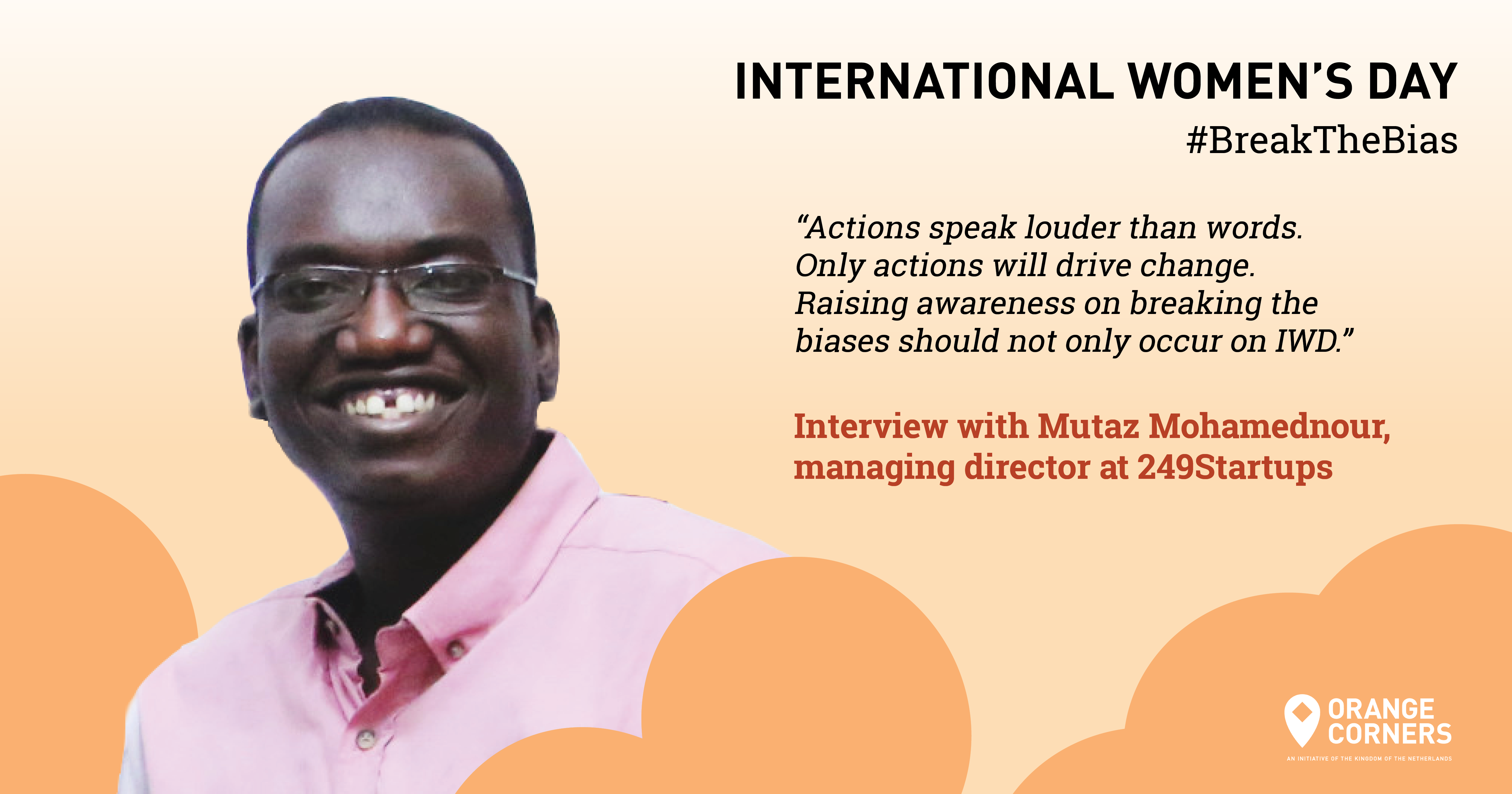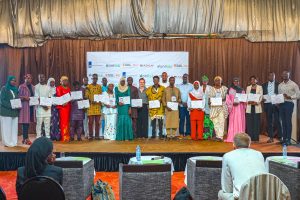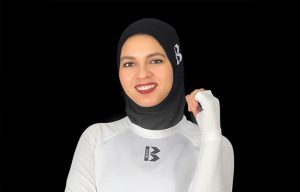The last guest in our interview series on gender equality in the wake of #InternationalWomensDay: Mutaz Mohamednour, manager director at 249Startups! This social enterprise fosters and supports passionate entrepreneurs in Sudan, contributing to a stronger entrepreneurial ecosystem. Orange Corners HQ interviewed Mutaz to know more about his view on gender equality.
Why is it important to celebrate International Women’s Day and how do you celebrate it at 249 Startups?
“International days that are celebrated across the world, such as IWD, are always important days for us. We assess whether we are doing enough, whether we meet the targets and try to improve within the company. With regard to women empowerment, we try to celebrate the achievements of the past year and reflect on our shortcomings. I personally think that just posting something on social media is not enough, as that won’t bridge the gender gap suddenly. People won’t return to their job the next day and do things differently. Changing behaviour takes time. At 249Startups, we hope to continue celebrating this day for the rest of the month and better understand the biases women entrepreneurs face. Not only professionally, but also on a personal level. Because what you learn in the workplace, you can bring home and the other way around.
From the moment we launched 249Startups, we have set up an additional health and counseling service for women. Nevertheless, it is also important for men to understand the differences in treatment between them and women and why they are present. In general, unfortunately no one is doing enough in their community and country to change those differences. Therefore, here at 249Startups, we try to address the problem at its roots in order to better understand the conflicts, problems and potential solutions in the workplace.”
“In Sudan there is the general assumption that women should focus on getting married, stay home and take care of the children. Whereas men make the decisions, build a career and earn money for their family.”
Could you tell us a bit about stereotypical assumptions in Sudan?
“The social structures that exist in our culture might not be very noticeable at first sight. However, there is a difference in the way that men and women are treated on both a professional and personal level. There is the general assumption that women should focus on their personal life: Their main life goal is to get married, stay home and take care of the children. Of course, you can still go and study, and apply for a job, but the thought of getting married is still present. For men, the general idea is that you’re the one making the decisions, building a career and earning money in order to marry a woman that will stay at home and take care of you.
You also see these social structures within our programme. For example, we selected a woman a couple of days before she got married. Then suddenly, she felt the pressure to leave the programme and stay at home and live with her husband. It was really unfortunate, because she was so talented. I also see a different kind of pressure for those already participating in the programme, especially from the mothers of female entrepreneurs. Mostly the dads say: “go out, pursue your dreams and expand your network”. But then you find that the mothers don’t agree with that. They believe it is better to have a husband and get a proper life. So there is also pressure from the family side of female entrepreneurs which might interrupt their personal growth.”
What differences do you see between female and male entrepreneurs?
“In general, people think that women often start working in a certain type of business sector (fashion, food), as people have preconceived opinions that women won’t do as well as men in other types of business such as Fin(tech) or finance. Experiences at 249Startups have proved otherwise. We have seen female entrepreneurs in those industries doing even better than the men because of their perseverance. They try to make it happen even with all the challenges they face, such as working in a market that is fully dominated by men. Women might face harassment, but that doesn’t discourage them to become the leader of the market. Women hold on and stick to their dreams, showing the world that they are able to work in different sectors than people assume. It is really powerful to see and it underlines that women are able to break the biases themselves.”
How does 249Startups support female entrepreneurs?
We have tried to implement different policies and activities in order to build an inclusive and safe environment, enabling females to operate and be themselves. Although this is a good initiative, I think there’s still lots of work to be done in addition to these policies. We also have a code of conduct that every participant needs to adhere to. We try to make our participants talk about the reasons behind this code of conduct so that the people will get used to talking about stigmas and why they are there. It creates a safe environment in which women can be themselves and do business. Together with the Women Entrepreneurship Empowerment Network, we are committed to empowering female entrepreneurs to achieve success on their own terms and to make business more inclusive. I am also proud to say that most of the people working in our team are women. If you ask me, I would say that I prefer hiring a female employee just because they are more competent and competitive. This shows that 249Startups will continue to support women empowerment, which I personally endorse.”
“Actions speak louder than words as only actions will drive change. Raising awareness on breaking the biases should not only occur on IWD.”
Could you explain to us who were your role models back in the days?
My home situation was a bit different than others, because I grew up in a family where my mother and father were sharing the parental responsibilities. My mother was the one who was taking care of the whole family and went to work afterwards. This was so encouraging to see. I think that this experience contributed tremendously to my personal journey. As I was growing up, I also met a couple of amazing female leaders. They continuously showed me how committed they were, assuring me that there is no real difference between men and women in regard to doing business. I think in general, these personal contributions have made me into a person that perceives all issues and challenges and tries to do more in order to address and overcome them.
Referring back to IWD and gender equality, we really need to look at ourselves and think how we are going to address this correctly. You sometimes find yourself doing things that are not contributing to bridge the gaps and issues we face. What we need to do on a continuous basis, is ensuring that what we’ve been discussing, will be implemented. Actions speak louder than words, as only action will drive change. Raising awareness on breaking the biases should not only occur on IWD.”





